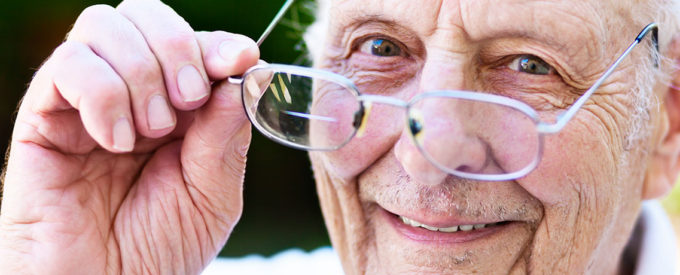
Have you noticed that the older you get the harder it gets to focus on what you’re seeing or reading?
Just like muscle strength, vision declines as you age. It’s a process that happens to all of us. Normally the difference in vision isn’t anything to be concerned with and is to be expected. However, there are times when extreme changes need to be explored to rule out disease and ensure your eye health.
Most age-related eye changes occur so slowly that we naturally compensate by holding our reading material or the object of our focus further and further away. This gradual change is due to the lenses in our eyes hardening ever so slightly as we age. This age-related change is called Presbyopia and affects everyone to some degree or another. Presbyopia usually shows up after the age of 40 and continues throughout our lifetime. Eventually as Presbyopia gets worse you’ll need sight correction through glasses or surgery.
Experiencing failing vision can have a dramatic effect on your lifestyle. When you experience vision loss it will inevitably have a negative outcome on driving and remaining independent. Often the thought of stumbling and falling due to the inability to see clearly causes social withdrawal and can lead to depression and anxiety. That’s why it’s so important when you notice any changes in your sight that you immediately speak to your doctor.
Any acute visual field loss, either partial or complete, mandates an immediate visit to the emergency room. Many of the causes of acute vision loss can be treated if addressed immediately. Like a stroke and heart attack, the urgency is measured in minutes. The sooner one receives appropriate intervention, the greater the chances for complete recovery.
There are five common eye problems that seniors experience:
Glaucoma
Glaucoma is the second-leading cause of blindness in the US and is actually a group of eye disorders that progressively cause damage to the optic nerve. This damage does not typically cause symptoms until it is too late. Checking for the pressure in the eye with screening tests is vital for diagnosis and treatment. Fortunately, this disease is very treatable, but it often goes unrecognized until visual loss has occurred.
Cataracts
About 24.5 million American seniors suffer with cataracts, and this is the most common cause of blindness today. Cataract surgery, where the diseased, cloudy lens is removed and replaced with an artificial lens, is very common and effective. Modern surgical technique is extremely safe with few major complications. Individuals can experience their vision transformed from being blind or near blind to near normal in a matter of an hour or so. This procedure is one of the great successes of modern medicine. It leads to dramatic improvement in quality of life for millions of people.
Macular Degeneration
For seniors over 50, age-related Macular Degeneration is the leading cause of severe vision loss. Again, early detection and treatment is very important.
Blepharitis
Blepharitis is the inflammation or infection of the eyelid and can cause red, irritated, itchy eyelids and can lead to a scaling around the eyelashes that is reminiscent of dandruff.
Vision Problems Related to Systemic Health
Diseases like high blood pressure or diabetes can lead to vision problems and vision damage.
Since vision is undoubtedly one of the most important health issues we experience, it is critical that any change you notice in your vision should be addressed with your medical professional to help guarantee the quality of your life is sustained.
If you’ve noticed changes or have questions, call your Be Well MD physician. We’re here to help.


